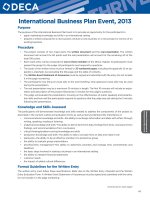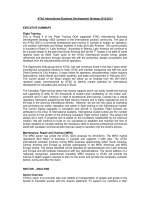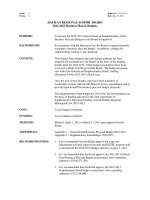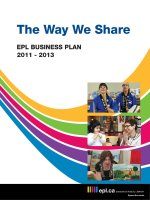Business Plan 2012–2013: Visit Britain pptx
Bạn đang xem bản rút gọn của tài liệu. Xem và tải ngay bản đầy đủ của tài liệu tại đây (646.66 KB, 25 trang )
1
Business Plan
2012–2013
2
Contents
Executive Summary 3
1. Our Business 4
2. The Context 7
Industry size 7
Britain’s image and competitive position 7
Priority inbound markets 7
VisitBritain’s contribution 8
Government priorities 9
Tourism landscape 9
Economic conditions 9
Access 10
Geopolitics 11
2012: the challenge and the opportunity 11
3. Our Activity 12
1. Inspiring travellers from overseas to visit and explore Britain 12
2. Delivering a global network to support tourism promotion overseas 14
3. Advise Government and industry on tourism – particularly on issues that affect our global competitiveness 15
4. Maximising public investment through partner engagement and commercial activity 16
Managing our business 18
4. Key Measures 19
5. Financial Information 22
Risk management 22
Summary income and expenditure budget 23
Appendix 24
Significant assumptions 24
3
Executive Summary
2012 is set to be a big year for Britain, a big year for DCMS and so a big year for VisitBritain. This year
Britain will host the London 2012 Olympic and Paralympic Games, the London 2012 Festival and a
whole host of other one-off cultural and sporting events, as well as celebrate the Queen’s Diamond
Jubilee. This is Britain’s moment and the eyes of the world will be on us.
Tourism is key to the Government’s plans to stimulate economic growth, create jobs and rebalance
Britain’s economy. VisitBritain’s value rests on our ability to sell Britain effectively overseas. We secure
partnerships which double the Government’s investment and extend our reach to bring in more
international visitors who spend money here which delivers that growth and jobs.
In 2011 Britain had its best year for a long time in terms of visitor spend - indeed we welcomed a record
number of nearly 12 million holiday visitors - and our forecast for 2012 suggests that this will hold level -
with 30.7 million overseas visitor arrivals expected in 2012, spending £17.6 billion. Maintaining current
visitor levels would be a good outcome in a year that is proving difficult to predict due to the current
global economic climate and the impact this may have in many of our key markets, our competitiveness
and value against other destinations, and of course the impact that the hosting of the 2012 Games may
have on the displacement of visitors.
VisitBritain has a crucial part to play, and we will be judged on our results – what we deliver for Britain
and the tourism industry, how well we leverage the Games-time opportunities and how we are valued
by our stakeholders.
Our key priorities for the year are:
The continued roll out of the GREAT Britain marketing programme, with an image campaign in
key global cities, and a tactical campaign to encourage people to travel now
Securing and maintaining strong partnerships with businesses and organisations that extend
our penetration and reach and promote Britain
Maintaining the financial contribution that retail makes to the funds of VisitBritain
The showcasing of Britain around the Games to ensure positive coverage in the world’s media
Continuing to research and provide analysis on Britain’s competitive position in all our markets
Working in partnership with the industry, by the end of 2012-13, we aim to improve Britain’s global
position as one of the world’s top destinations, generating media coverage with an advertising
equivalent value of £400 million. We will also plan to produce a set of market strategies which identifies
the barriers to increasing competitiveness, and a range of solutions involving VisitBritain and other
stakeholders. Overall, in 2012/13 we aim to deliver £375 million in visitor spend to help generate jobs
and rebuild the British economy.
4
1. Our Business
VisitBritain is the national tourism agency, responsible for marketing Britain
worldwide and developing Britain’s visitor economy.
A non-departmental public body, funded by the Department for Culture,
Media and Sport (DCMS), we work with partners in the UK and overseas to
ensure that Britain is marketed in an inspirational and relevant way around
the world. Our partners include government agencies, such as UKTI, FCO
and British Council, airlines and operators, global brands such as Samsung
and the English Premier League, as well as the official tourism bodies for
London, England, Scotland and Wales.
2012 is set to be a big year for Britain, a big year for DCMS and so a big
year for VisitBritain too. This year Britain will host the London 2012 Olympic
and Paralympic Games as well as a whole host of other cultural and sporting
events and celebrate the Queen’s Diamond Jubilee.
Our key priorities for the year are:
The continued roll out of the GREAT Britain marketing programme,
with an image campaign in key global cities, and a tactical campaign
to encourage people to travel now
Securing and maintaining strong partnerships with businesses and
organisations that extend our penetration and reach, and promote
Britain
Maintaining the financial contribution that retail makes to the funds of
VisitBritain
The showcasing of Britain around the Games to ensure positive
coverage in the world’s media
Continuing to research and provide analysis on Britain’s competitive
position in all our markets
Our mission
:
to build the value of tourism to Britain,
working in partnership with the industry and nations and
regions to generate additional visitor spend
Our vision:
To inspire the world to
explore Britain
5
Our consumer, trade and media websites reach a global audience, and
we have a staffed presence in 21 overseas markets – those that offer
the best immediate return and best future prospects for Britain.
Collectively, these markets account for around 70% of inbound tourism
spend.
We use a range of traditional and innovative marketing approaches including
brand and tactical advertising, digital and social media, press and PR activity
and working with travel trade intermediaries.
We also have a statutory advisory role, providing analysis and advice on
tourism, in particular, the opportunities for, and the barriers to inbound
tourism growth. In addition, we provide research, market intelligence and
analysis to inform Government and the British tourism industry.
Our Priority Markets
Americas
USA, Canada, Brazil
Europe
Austria, Belgium,
Denmark, France,
Germany, Italy,
Netherlands, Norway,
Poland, Russia, Spain,
Sweden, Switzerland
Asia Pacific, Middle
East & Africa
Australia, China, India
Japan, UAE
6
Our four-point strategy aims to increase overseas visitor spend to all parts of Britain and improve Britain’s
ranking on the destination wish-list for international travellers.
Our strategy
We will support the growth of Britain’s visitor economy in four key ways:
1. Inspire travellers from overseas to visit and explore Britain
2. Deliver a global network to support tourism promotion overseas
3. Advise Government and the industry on tourism, particularly on issues that affect our global
competitiveness
4. Maximise public investment through partner engagement and commercial activity
What we are working to achieve by the end of 2015
- £1 billion in PR coverage
- 4.7 million visitors from overseas
- £2.3 billion visitor spend
- Around 60,000 new job opportunities
- A measurable increase in positive perceptions of Britain and aspiration to visit
- Partner support for our activities worth £52.5 million in cash and in kind
- Recognition from Government that tourism is delivering on its economic growth agenda
- A series of market strategies
which identify the competitive challenges facing Britain, and their solutions,
adopted by Government and industry as a blueprint for the development of international tourism to Britain
7
2. The Context
VisitBritain operates within an ever-changing environment and many different issues have informed this
business plan. This section explains the key parameters and influences that underpin our planning.
Industry size
Tourism is the UK’s third highest export earner behind chemicals and financial services. It supports 2.6 million
jobs and over 200,000 small and medium-sized enterprises. It already contributes £115 billion (8.2%) to the
UK’s GDP
1
and is set to be one of Britain’s best performing sectors over the coming decade. Spending by
international visitors is forecast to almost double to £31 billion by 2020.
Britain’s image and competitive position
The United Kingdom is a strong nation brand, ranking 3rd out of 50 countries
2
. Research consistently shows
that Britain’s key strengths are its heritage, culture, education, sport and London. It is weaker on welcome
(12
th
), natural beauty (22
nd
) and value for money
3
.
In 2010, we occupied sixth place in the international tourist arrivals league table and seventh place in terms of
earnings from international tourism
4
. Germany and Turkey are now close on our heels when it comes to
arrivals and Australia is not far behind us in receipts.
These figures serve to illustrate just how competitive the global tourism industry is. We know we have stiff
competition, not only in the form of traditionally popular destinations but from a growing number of emerging
markets. China, for example, is now in the top three most visited countries. If first-time travellers from Asia,
India, the Middle East and Latin America are to be attracted, we must do everything we can to make Britain
an aspirational, welcoming and accessible destination in their eyes.
The 2011 World Economic Forum ‘Competitiveness Index’ ranked us seventh out of more than 130 worldwide
destinations. We are listed third in the world for ‘human, cultural and natural assets’, as well as for ‘access’,
11
th
for ‘business environment and infrastructure’ and 21
st
for ‘regulatory framework’
5
. However, for ‘price
competitiveness’ the UK is ranked 135
th
out of 139 countries’
Priority inbound markets
In 2010, our Market Investment Model (MIM), developed with Oxford Economics, helped us identify the best
prospects for tourism to Britain. Our focus is on 21 priority markets - those that offer the best immediate return
and best future prospects for Britain. Together they account for approximately 70% of inbound tourism spend.
1
Deloitte: The economic case for the visitor economy, September 2008
2
Anholt GFK Nations Brand Index 2011
3
Anholt GFK Nations Brand Index 2011
4
UNWTO
5
WEF Competitiveness Index
8
Priority Inbound Markets, visits and spend 2010
6
Market
Visits (000s)
Spend (£m)
USA
2,711
2,133
Germany
3,004
1,193
France
3,618
1,142
Australia
986
951
Spain
1,809
824
Italy
1,472
722
Netherlands
1,758
717
Canada
686
513
Belgium
1,136
401
Switzerland
623
367
India
371
363
Sweden
758
357
Norway
649
355
Poland
1,101
313
UAE
213
312
Denmark
550
245
Russia
170
194
China
109
184
Japan
223
182
Brazil
177
160
Austria
288
155
Hong Kong
131
129
VisitBritain’s contribution
VisitBritain’s makes a valuable contribution to the visitor economy - we inject revenue into the economy every
year through the additional visitor spend directly and indirectly generated by our international marketing and
our commercial activities, while our export platforms and business services achieve economies of scale
significantly reducing costs for many of our partners and saving public money. We also help enhance Britain’s
overall image as a country in which to work, invest and do business, thus contributing to the wider economy.
6
International Passenger Survey 2010 (shown in order of importance in terms of spend)
9
Government priorities
The Government Tourism Policy, published in March 2011, has three main objectives:
To fund the most ambitious marketing campaign ever to attract visitors to the UK in the years following
2012
To increase the proportion of UK residents holidaying in the UK
To increase the productivity of the tourism sector, making us one of the world’s top five most efficient and
competitive visitor economies in the world
The successful delivery of this marketing programme is our primary focus and we have maintained a
streamlined advisory function, providing advice to Government on issues which affect the UK’s international
competitiveness.
In November 2011, the Secretary of State confirmed that we would receive additional funds to help promote
Britain in key overseas markets in 2012. The money is part of the 'GREAT' initiative launched by the Prime
Minister in September to show the world that Britain is a great place to visit, to live, to invest and to do
business with. Up to £39 million will be invested in this campaign which is a collective effort with UKTI, British
Council and FCO who are all using the GREAT creative. VisitBritain’s allocation is £22.5 million.
Tourism is key to the Government’s plans to stimulate economic growth, create jobs and rebalance Britain’s
economy. VisitBritain’s value rests on its ability to sell Britain effectively overseas, to bring in more
international visitors who spend money here that delivers that growth and jobs. We have a crucial part to play
and will be judged on our results – what we deliver for Britain and the tourism industry, how well we leverage
the Games-time opportunities and how we are valued by our stakeholders.
Tourism landscape
Tourism structures across England continue to evolve and develop. VisitEngland has secured additional
funding from the Government’s Regional Growth Fund. This funding will ensure that the England domestic
campaign will be amplified at a local level and will support destinations all over the country to grow tourism in
their areas and create jobs.
London & Partners, the official promotional organisation for London, has been formed with the purpose of
attracting and delivering value to businesses, students and visitors.
Tourism is a devolved matter and Visit Scotland, and Visit Wales remain the responsibility of their respective
governments, and work closely overseas with VisitBritain.
Economic conditions
The global economy is currently in a period of turbulence, with the Governor of the Bank of England recently
suggesting that a financial crisis as bad as that of the Great Depression was a possibility.
While new technocrat governments in Greece and Italy have gone some way to easing market nerves, there
remains a very real risk of further instability due to the scale of sovereign debt in a number of Eurozone
countries, and whether or not sufficient political will exists to push through austerity measures. The latest
forecasts suggest that France will re-enter recession and that growth will be minimal even in Germany.
10
The US economy has suffered not just from the continued downbeat property market, but also from the
difficulties surrounding a political logjam in relation to raising the country’s debt ceiling. The fact that there is
a Presidential election in November 2012 may further inhibit the implementation of plans to address the US’s
economic difficulties.
Uncertainty is a sure recipe for unpredictable movements in exchange rates, and this could be particularly
important for prospects for inbound tourism to Britain should anything happen to strengthen or weaken
substantially the value of sterling against key currencies such as the US dollar and euro.
Exchange rates play a pivotal role in how competitive a destination is in attracting visitors and Britain has
enjoyed a favourable rate against most leading currencies over recent years, indeed for visitors from Australia
sterling is more affordable than at any time over the past quarter century.
Were Greece, or any other member, to be forced to exit membership of the single currency zone there may
be hefty shifts in relative sterling/euro exchange rates.
Currently the central forecast for the price of oil during 2012 is $110 per barrel, but again if the Eurozone and
North American economies do return to recession, it is likely that prices would fall unless demand was
replaced by growth in Asia Pacific.
A further economic risk in 2012 is that there will be on-going industrial action across Europe impacting on
transportation, with this risk extending to the UK in light of pressure on wage settlements and job security,
especially within the public sector.
While there are some concerns over the Chinese property market and an expected slowing in the rate of
economic expansion in Brazil, a number of developing economies continue to enjoy strong economic growth,
thereby increasing the numbers able to travel internationally.
Access
There are the usual changes to route networks being announced for 2012, but with little space for increased
capacity in the south east of England (most notably at Heathrow) possibilities for expansion are limited,
although the increased use of Airbus A380s should allow for some growth in passenger numbers. One
notable development in 2012 will be the advent of a substantial presence at Southend Airport by easyJet.
A few plans worth noting are increased capacity between the UK and USA thanks to additional flights
operated by British Airways from both New York and Miami, the UK and Moscow and Shanghai courtesy of
British Airways deploying larger planes on the route and UK and China with China Airways starting flights into
Gatwick and China Southern Airlines from Guangzhou to Heathrow.
Air Passenger Duty increased by 8% in early 2012, while the EU Emissions Trading Scheme started in
January 2012 - both likely to mean increasing fares for passengers.
Visitors to Britain from some markets require a visa in order to visit. These include key markets for future
growth, such as Russia, India, China and the United Arab Emirates. The visa application process, rather than
the price, is more often the determining factor. This reduces the desire in visa markets to visit Britain, and
perpetuates the idea that Britain is an unwelcoming destination.
11
Geopolitics
Nobody predicted the Arab Spring which simply confirms that the best one can really say about geopolitics is
that it can play a significant role in shaping international tourism flows. Although the situation in Egypt and
now Libya appears to be stabilising there remains unrest in other countries, particularly Syria. Tensions
between the US and Iran have recently deteriorated further.
2012: the challenge and the opportunity
Every year has its unknowns, but those for 2012 are more extensive than usual. Supply and demand are
never entirely in equilibrium, but in summer 2012 supply, most acutely in terms of hotel accommodation in
London, will be disrupted due to a significant percentage of the bed stock being held by LOCOG. The phased
release of unrequired rooms back onto the market may result in the normal lead time for booking trips to
Britain being atypical, with those with tickets for Games events booking very early and those ‘casual’ visitors
either booking late (once room rates fully reflect ‘actual’ demand) or alternatively postponing a potential trip to
a later date.
The Queen’s Diamond Jubilee and the London 2012 Olympic and Paralympic Games are two big moments
for Britain - an opportunity to raise our profile globally and present an attractive image of the country. But we
also need to reassure potential visitors that these big events are not reasons to stay away – quite the
contrary, they are invited.
We anticipate that the numbers of visits expected in 2012 will remain at the same level as that of 2011. This
would see 30.7 million overseas visitor arrivals in 2012, spending £17.6 billion. While these figures are in line
with expected numbers in 2011, maintaining current visitor levels - actually a record number of holiday visitors
- would be a good outcome in a year that is proving difficult to predict.
12
3. Our Activity
1. Inspiring travellers from overseas to visit and explore Britain
In 2012/13, VisitBritain enters into the second year of our four-year, £100 million public/private sector
marketing programme to capitalise on the once-in-a-lifetime opportunity of the events taking place in 2012 -
including the Queen’s Diamond Jubilee, London 2012 Festival and the London 2012 Olympic and Paralympic
Games in 2012. The programme has three simple objectives:
Build awareness of our attractiveness as a tourism destination amongst those who have not yet
visited Britain
Encourage prior visitors to return
Provide a series of opportunities and incentives to visit Britain now, working in partnership with
the private sector
The campaign proposition is simple, compelling and versatile – “GREAT Britain – You’re Invited” and is a
major part of a broader Government initiative to show the world that Britain is a great place to visit, to live, to
invest and to do business with.
In the second year of the programme (2012/13), the allocation of marketing funds (£11.2m GIA) will be used
to ensure even more effective tactical marketing – taking on board learnings from the first year. We will focus
our investment on those markets which offer the best immediate return and best future prospects for Britain;
provide an extensive PR programme for media during the key events of 2012, build on our social media
capability as well as digital offering and ensure we capitalise on Britain’s high profile by activating an attractive
post-Games programme from September 2012.
Additional government funding (2011-13) for the GREAT Britain programme will also allow us to carry out an
impactful, broader and deeper image campaign focusing on 14 key global cities, tightly integrated with other
work carried out by the FCO, UKTI and British Council.
The Britain brand proposition will remain unchanged, coupled with the showcasing of Britain’s core products -
this will be achieved by using and amplifying the key triggers for travel to Britain which are pillars of the
GREAT Britain campaign – culture, heritage, countryside, shopping, food, sport and music.
Along with our advertising and PR programme, integrated digital activities will create, distribute and amplify
content to inspire and motivate people to travel.
Intermediaries (travel agents and tour operators) play a significant role in the decision making process of
many international visitors, especially in the longer haul and BRIC markets and also in the area of special
interest travel in more mature markets and we will continue to work with these valuable influencers.
Key activity
Pre-Games - April-June 2012
A tactical and image campaign in key markets
Media visits and recces by major broadcasters
Games-time - June-September 2012
Olympic Torch Relay (from mid-May): a combination of PR and social media activity around High Profile
Torch bearers in iconic destinations in partnership with Torch presenting partner Samsung
13
The Diamond Jubilee weekend: highlighting Britain’s heritage by showcasing royal heritage and Jubilee-
related destinations and events outside of London/the summer months through PR, travel trade and retail
channels to encourage regional and seasonal spread.
London 2012 Festival: showcasing events and festivals through media and digital channels
Games-time operations: a focussed PR, digital and social media strategy, providing Games-time
information in partnership with the BBC, Samsung and LOCOG, supporting up to 20,000 unaccredited
media which are expected at the London Media Centre (our main centre for media operations) and
hosting a delegation of VIP tour operators during Games-time with representatives from our key markets,
delivered in conjunction with campaign and destination partners
Post-Games - September 2012-March 2013
A larger tactical and image campaign, capitalising on the extensive media coverage of Britain and
showcasing new reasons to come to Britain in 2013 together with compelling industry offers
Key outcomes
Positive editorial coverage of Britain in print, broadcast and online media
Visits to our family of websites and to content on third-party sites
Increased followers and higher engagement levels on social media
Profitable digital platforms (including F-commerce and User-Generated Content), customer
acquisition, retention, deeper engagement and revenue generation
Additional visitor spend
Increased brand awareness and positive sentiment
Secured and maintained strong partnerships with businesses and organisations that extend our
penetration and reach and promote Britain
14
2. Delivering a global network to support tourism promotion overseas
We have a staffed presence in 21 markets – those that offer the best immediate return and best future
prospects for Britain. Our global footprint enables us to provide analysis and advice on the issues facing
potential visitors and the barriers to inbound tourism growth. We provide research, market intelligence and
analysis to inform the British tourism industry as well as arrange and facilitate sales missions and trade
events, secure partners on-territory and play our part in the promotion of Britain overseas with public
diplomacy partners: the FCO, UKTI and British Council. Our network also supports the development and
delivery of the GREAT Britain marketing programme in market.
Key activity
Identify and clarify building blocks of competitiveness and opportunity to grow inbound tourism
Provide market insights and knowledge to support development of market plans for each priority market
Communicate market plans to internal and external stakeholders to influence stakeholder actions to
improve Britain’s competitive position
Implement on-territory marketing programmes (insights, B2B, PR, partnership management) to support
the GREAT Britain campaign
Connect British suppliers with overseas travel firms and media by running missions and events and
exhibiting at trade fairs
Key outcomes
Positive influence on export earnings of British travel goods and services, evaluated using agreed
measures
Maintenance of strong and enduring relationships with the official tourism bodies for London, England,
Scotland and Wales, government agencies such as UKTI and British Council, and the UK trade
Maintenance of network of relevant travel trade, media and public diplomacy partners
15
3. Advise Government and industry on tourism – particularly on issues that affect our
global competitiveness
VisitBritain aims to be a trusted advisor to Government and industry on international tourism. We deliver
insights, trends, analysis and industry performance research targeted at industry sectors to enable the
industry to market more effectively overseas and develop products that appeal to the international visitor. We
have a statutory duty to advise Government on tourism matters. Our advisory function has a clear focus on
international competitiveness, and the assessment of Britain’s situation relative to our key competitors.
Key activity
Deliver insights, trends, analysis and industry performance research targeted at industry sectors to enable
the industry to market more effectively overseas and develop products that appeal to the international
visitor
Deliver on our statutory duty to advise Government on tourism matters - our advisory function has a clear
focus on international competitiveness, and the assessment of Britain’s situation relative to our key
competitors
Lead on the production of market plans for each of VisitBritain’s key markets which identify the barriers to
increasing competitiveness, and a range of solutions involving VisitBritain and other stakeholders
Work with the Minister for Tourism and Heritage and across government departments to deliver on the
coalition Government’s tourism policy’s aims
Promote the importance of inbound tourism as delivering growth and of VisitBritain activity to support
tourism growth in business, economic and trade media
Provide clear and regular communications with stakeholders, media, industry partners and staff in support
of corporate objectives
Lead TIER
7
and IAG
8
in times of crisis and through Games-time briefings
7
Tourism Industry Emergency Response Group: a group of key tourism industry organisations and government to develop plans for
crisis scenarios as well as managing the tourism industry’s response to a specific crisis.
8
Immediate Action Group: internal group to manage VisitBritain’s response to specific crisis.
Key outcomes
Stakeholders and industry partners able to make better informed decisions about market and product
investment and operational policies
Political and industry support for tourism and VisitBritain activity
Market plans for all VisitBritain’s overseas markets which identify a series of actions with milestones to
address Britain’s competitiveness (e.g. improvements to product distribution and packaging as well as
changes to government policy) and engagement on their delivery
Increased share of voice for tourism on the international stage and in the British business media
16
4. Maximising public investment through partner engagement and commercial activity
Working in partnership
We work with a wide range of commercial partners to secure funds and marketing assets to market Britain
more effectively. Our four-year funding agreement is dependent upon raising £50 million in a combination of
cash and marketing in-kind support from industry partners.
Key activity
Development of tailored partnership proposition and engagement to recruit and maintain partnerships with
significant suppliers
Collaboration with destination bodies, aggregating content
Provision of sponsorship opportunities for specific product partners for the pillars of the GREAT Britain
campaign (see marketing)
Work with key trade associations to provide a platform for SME’s to benefit from the “GREAT Britain –
You’re Invited” programme
Retail
We also run a retail operation – a suite of online shops (www.visitbritainshop.com), offline retail activities and
distribution of the VisitBritain Shop platform to third parties. Through our retail activities we leverage our brand
to generate income, as well as enhance the ‘Welcome’ message by offering visitors a global transactional
platform in their own language and currency. It also provides our partners with a route to market and a stream
of ancillary income without any investment required on their part.
Key activity
Continuous improvement of customer experience when purchasing and redeeming products
Formulate and implement an online marketing strategy to include pay per click advertising, search engine
optimisation and content distribution with internal and external stakeholders
Embed the new designs on Webshop and deliver a continual platform improvement programme directly
linked to revenue and cost saving factors
Sign up new affiliates/work with marketing partners to negotiate new global distribution agreements
Manage key accounts to maximise revenue potential
Key outcomes
Raise £8.1m direct cash contribution
Raise £5.6m in-kind contribution
17
Key Outcomes
Net profit contribution of £400,000
Improved customer experience by embedding the new design and by improving merchandising,
product information and imagery
Contribution to VAT recovery and exchange rate offset
18
Managing our business
Business Services comprises finance, HR, IT, legal, company secretariat and facilities for both VisitEngland
and VisitBritain. It is responsible for putting systems, policies and procedures in place to ensure that both
organisations adhere to best practice in relation to all areas of financial and non-financial governance. It
provides advice to the Chairman and Boards, Chief Executives and Senior Management teams to ensure best
value for money is obtained and exposure to risk is minimized. The department operates highly developed
control systems and procedures which are continually reviewed and improved. The team also ensures that
both organisations’ transparency complies with the Government’s requirements under the transparency
agenda and that requests for information under the Freedom of Information Act are responded to within the
statutory 21 working days.
In an environment of financial constraint we have been set the challenging target of reducing overhead by
50% by 2015, the end of the current spending review. Through early implementation of change in 2011/12 the
majority of actions needed to meet this target were taken. However, with the award of additional funds, in
2012/13 VisitBritain is now managing greater activity than ever before. The key focus will be on the secure
and transparent management of our resource in an increasingly complex and constrained environment.
Key activity
Introduction and rollout of Microsoft Sharepoint software
Support of finance management and reporting, particularly around new funding
A review of all financial and HR processes and procedures and their presentation
Upgraded induction programme and training for staff
Manage the organisation and its infrastructure through the period of peak activity in 2012
Manage a possible office move (dependent on future of 1 Palace Street)
Key Outcomes
Improved communication within the organisation and with partners in a more controlled and secure
environment
New and improved financial reports
Simplified processes that manage the organisation safely
Motivated, skilled work force
19
4. Key Measures
Category
Definition
Measurement Tool
Target
Marketing
Business generated
The amount visitors spend
in Britain that would not
have happened had there
not been VisitBritain
interventions
By surveying a random
sample of those who have
come into contact with
VisitBritain over the specified
time period, e.g. as a result of
marketing campaigns or those
registering on our website
£375 million (visitor
spend in Britain)
Image building
Increased shift in positive
sentiment and interest in
visiting Britain
Brand tracking research by
Holden Pearmain
In development
Advertising-
equivalent value
Monetary value of all
editorial coverage
generated by us based on
cost of the equivalent
advertising space
By independent evaluation by
Metrica of every piece of
coverage generated by us
£400 million
Visits to family of
websites
The number of visits to any
website with VisitBritain in
the name
By evaluation of reports
generated by Netinsight and
Google Analytics
12.6 million
Visits to content
provided to 3
rd
parties
The number of views of our
content on 3
rd
party
websites
By analysis of reports
generated by
Facebook/Google Analytics
and reports from 3
rd
parties,
such as Yahoo! Travel
5 million views
through Yahoo!
10 million views of
video content
Data acquisition
Web visitors opting-in to
receive e-communications
In development
In development
Social Media and
Commerce
Reach, engagement and
via social media channels
Conversion via social
media
Facebook analytics
Twitter analytics
In development
1.5 million fans; 1%
engagement
100,000 followers;
reach of 750,000
In development
20
Category
Definition
Measurement Tool
Target
Global Network
Export earnings
Additional profits to UK
businesses as a result of
our interventions
In development
In development
Industry satisfaction
Levels of satisfaction in
export platforms
Questionnaires to partners
post-activity
80% satisfied
Championing Tourism
Policy
Delivering the Government
Tourism Policy, and
advising Government on
policy making to support
Britain’s global
competitiveness
Implementation of Tourism
Policy objectives (DCMS
business plan)
Reports, consultations and
policies which referenced
tourism by government
departments
Delivery of
VisitBritain
responsibilities in
the Tourism Policy
5 key departments
demonstrate
consideration
Market plans
A plan for each of
VisitBritain’s key markets
which identifies the barriers
to increasing
competitiveness, and a
range of solutions involving
VisitBritain and other
stakeholders
Finalised market plans
Engagement strategies for UK
and overseas markets
21 market plans
Action plans in place
Political engagement
Parliamentarians to be
informed and engaged with
tourism issues
Tracking of Parliamentarians
written to/engaged with face-
to-face
Written updates to
MPs and Peers 3
times a year
Briefing session with
CMS Select
Committee
Advertising-
equivalent value
(corporate)
Monetary value of all
editorial coverage
generated by us based on
the cost of the equivalent
advertising space
By independent evaluation of
every piece of coverage
generated by us by Metrica
£3million
21
Category
Definition
Measurement Tool
Target
Maximising Public Investment
Partner engagement
Securing partnership
funding
Audited cash receipts, menu
and rate card
Cash: £8.1 million
In-kind: £5.6 million
Retail
Net profit contribution
Audited financial performance
£400,000
Waste recycling
Percentage of waste from 1
Palace Street recycled
By weight of waste recycled
as a percentage of total waste
70%
22
5. Financial Information
Risk management
Our strategy for identifying and managing risks is based on best practice and embedded in our operational
plans, with established policies and procedures to identify, treat and monitor principal business risks
effectively. We have a Risk Management Framework which categorizes risks into four distinct categories:
strategic, reputational, operational and financial. Our risks are reviewed by management on a regular basis,
annually by our Board and are subject to regular review by our Audit Committee. The key identified risks are:
Risk
Risk Management Strategy
Strategic
Marketing
Programme
does not
achieve targets
Partner recruitment strategy to secure strong offers from partners
Test ads on consumers in market and dial branding elements up and down accordingly
Continuous monitoring of progress towards targets and re-allocation of funding
between markets as necessary
Choice of media channels based on wide experience of VisitBritain, its partners and
suppliers
Tourism Industry Response Group in place to respond to external crises which may
impact on inbound tourism
Reputational
Downturn in
visitor numbers
in 2012 due to
displacement is
perceived to be
due to the failure
of the GREAT
Britain
campaign
‘Flat’ forecast issued based on robust research
Communications plan to manage expectations
Communication of campaign results against targets
Operational
Major business
interruption
Business continuity plan in place
Penetration and load testing of websites undertaken and action taken as necessary
Financial
Failure to meet
targets due to
less funding for
operational
spend caused
by unplanned
calls on budget
Robust financial management regime supported by experienced staff with oversight by
Audit Committee, and Internal and external Auditors
Fiscal impact undertaken for all new activity
Tax impact of Business Plan assessed
Treasury Management Policy in place
23
Summary income and expenditure budget
£'000
2011/12
2012/13
VisitBritain
VisitBritain
Variances
Income
GIA - Core
26,980
24,592
(2,388)
GIA - GREAT Funding
10,000
12,500
2,500
GIA - Transfer (to)/from VE
(400)
400
800
Partnership funding
6,493
8,623
2,130
Commercial Income - Retail
9,734
9,616
(118)
Other income
1,646
361
(1,285)
Total
Income
54,453
56,093
1,639
Expenditure
Programme
25,698
30,649
(4,951)
Commercial Cost of Sales - Retail
8,619
8,485
134
Staff Cost
9,249
9,226
23
Staff Travel & Exp
590
570
20
Property costs (HQ and 21 overseas
locations)
3,385
2,494
891
Technology Costs
1,598
1,393
205
Irrecoverable VAT
675
649
26
Pension Deficit Recovery Plan
619
639
(20)
Change Programme
3,637
1,335
2,302
Other Operational Costs
1,903
1,903
0
Shared Services Allocation to VE
(1,520)
(1,250)
(270)
Total Expenditure
54,453
56,093
(1,639)
24
Appendix
Significant assumptions
When developing the 2012/13 Business Plan and outcome metrics the following key assumptions are
proposed:
Global Economy
The global economy, and the economies of our most important inbound source markets, will not fall
back into recession in 2012
UK Economy
Sterling remains favourable for inbound tourism
UK Competitiveness
There are no significant changes to taxes that would affect inbound visitors
Global Geopolitics
There are no terrorist attacks in Britain or elsewhere that would lead to a change in propensity for
tourists to travel internationally and/or visit Britain
The global geopolitical situation remains stable
Competitor Activity
The quality and quantity of competitor marketing in our primary source markets will continue at
current levels
Access to Britain
No changes in the level of fuel duty surcharges imposed by airlines (the EU Emissions Trading
Scheme comes into effect and latest analysis estimates it will ‘cost’ airlines operating in (to/from)
Europe €1.1bn - there is a risk that this will be passed on to airline customers in the shape of higher
fares/fees)
There are no ‘exceptional’ events dislocating transport infrastructure for significant periods
No major commercial airline bringing inbound visitors to Britain will collapse or experience an
extended period of strike action
There is no global pandemic
There are no changes in the countries from which a visa is required to visit Britain, or significant
change in visa application processes or fees
UK Inflation
UK inflation rate 3%
25
Exchange Rates
Budget rates for the major currencies are:
o US$ 1.56
o Euro 1.19
A significant proportion of currency requirement can be matched to shop income
Marketing Activity
The Queen’s Diamond Jubilee and London 2012 Olympic and Paralympic Games will deliver
anticipated opportunity to improve the image of Britain as a tourist destination
No commercial partner withdraws from the marketing programme
We achieve matched funding targets
Retail
Supplier relationships and terms of business stable









